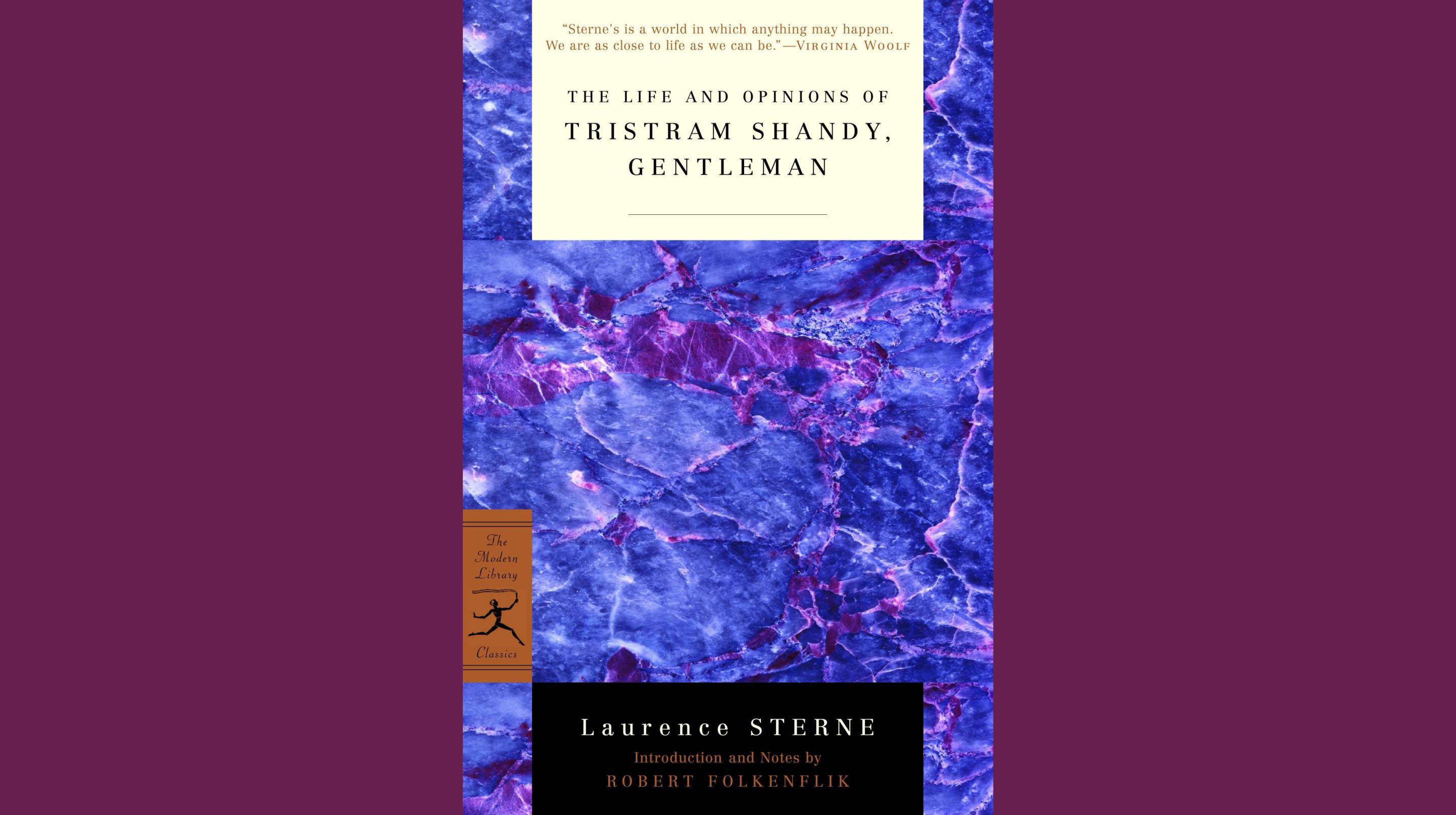Tristram Shandy Would Surely Call Us “Jack Asses” For Writing This Post
2:50 PM EST on November 16, 2022

Welcome back to Defector Reads A Book! Our autumn DRAB selection was Laurence Sterne's The Life and Opinions of Tristram Shandy, Gentleman, which the Defector book sickos have read and discussed. We’ll be down in the comments to chat with you as soon as you’re done reading.
Giri Nathan: Dear sir, madam, and maybe even Jenny—let’s talk about this insane tome. I’ll start simple: What was your experience of reading it?
Maitreyi Anantharaman: I have to begin my answer with a digression. Recently, for a story, I was watching an old football game. The game was extremely snowy, enough so that I couldn’t make out the yard lines; basically, I was keyed in on the action but without any sense of where on the field the players were. At one point the quarterback fumbled a snap and recovered it, but the defensive players started doing the safety gesture, and I thought, Wait, they were near the end zone? Anyway, that was the experience of reading Tristram. Just keeping perspective is a huge battle. A character will begin a sentence, be interrupted by our narrator, and only finish the sentence 50 pages later, by which time I’ve forgotten they ever started a sentence. I read a physical copy and listened to an audiobook in parts, and I came to appreciate each medium in its own way. Listening to the book gives you a great feel for the strange momentum of it, and I think made the book funnier. The audiobook narrator announcing, “Volume II” perfectly sets up Tristram going, “I’ve begun a new book…” But in physical form, the book is fun too—all the weird digressions and punctuation and typographical choices can’t totally be appreciated when you listen.
Barry Petchesky: I struggled mightily at first with the 18th-century diction, in that way almost all older literature feels stiff and unnatural; it felt like homework, frankly. But that feeling went away pretty quickly, because Sterne/Tristram is such a loose, amiable sort of writer that it started to feel recognizably human, like a slightly drunk guy telling a story in a bar. Honestly, Tristram would be a good guest on Normal Gossip. And as I realized that the digressions were the backbone of the book, it felt less important to me to try to keep up with the thread of any given story, and more about just letting the words wash over me.
GN: At baseline, I read books embarrassingly slowly. And I was reading a physical copy that was just loaded up with endnotes. Through the first two volumes, I kept dutifully checking the back to understand every musty allusion. Even though it was nice to have all these questions answered on a sentence-by-sentence basis, this made for choppy and not always enjoyable reading, and like you guys, I learned to let go and just let my brain be hijacked by Tristram’s fancies. I think there’s a context where it would be intensely rewarding to engage with the book a couple chapters of a time—it’d be a great semester-long class, picking at all of Sterne’s stupid little bits and gags—but also so much of the pleasure of this book is the romp. So you gotta romp. I also found I could just not read this before bed. Probably better in daylight, with a stimulating beverage. As I kept going I got a handle on the rhythms and actually flew through the last few volumes as if I were binging blog posts.
BP: Tristram is the Anglosphere’s first blogger, right? These were blogs. I felt it in my bones when he said his way of starting a book “is the most religious—for I begin with writing the first sentence—and trusting to Almighty God for the second.” The running joke was that he had no idea where he was going when he sat down to write, and it did make me wonder how much of that was true or not for Sterne. The digressions often had such good comedic timing that it felt tightly plotted.
MA: This is the big question of Tristram, right? Does Tristram have any control over the story or is he powerless to it? Like when dogs on leashes drag their owners around. A gag I liked was the way time passes as he’s writing, so that he's able to begin Book VI with a disdainful look at what the critics (“Jack Asses” lol) have said about the first five volumes.
GN: So I think it was published a volume at a time, and I read that there were events referred to later in the book that hadn’t yet happened in the real world at the outset of Sterne’s writing. It’s fun to think about how much of this haphazardness is by design and how much of it was Sterne flying by the seat of his pants. Some of the pacing and structure of these jokes—I’m thinking especially of the circular dirty joke about the map in the last volume—is just too good to feel totally improvised, and I kept thinking that Sterne had more plans in his head than Tristram would personally admit to. I really loved Tristram’s constant agitations at the critics, haters and losers out there; he would’ve gotten his hands dirty in the comments section if he could. He is always thinking about how he’ll be read, how he’ll afford the writing, how he’ll get to everything he has to say, how much he cares about his readers.
BP: I loved all the meta aspects of writing. There was one sequence where he teased the contents of an upcoming chapter, then wrote that he had written it down but tore it out of the manuscript because it didn’t work (and wondered aloud “whether the same experiment might not be made as successfully upon sundry other chapters”), then proceeded to describe what was in the excised chapter anyway—a roundabout and fresh way of turning a normal chapter of description into something else entirely. I wonder how many contemporary minds this book blew; it blew mine a couple of times.
MA: Giri, yes. I loved how particular he is about how his book should be read. Misinterpretation spooks him. This is the funny thing about Tristram—he wants to be so meticulous in some respects. A favorite Tristram digression of mine was his refusal to estimate how long Yorick had been “exactly so spelt” because “I would not shake my credit in telling an improbable truth, however indisputable in itself.” But then you zoom out to find this rambling and ridiculous book, one that isn't precise at all. Even the actual reader, as Tristram imagines them, shapeshifts. Sometimes it’s Madam, and he’s scolding her for forgetting details or misreading something. Sometimes it’s Sir, and Tristram is gently explaining himself to him. The book draws so much attention to its form.
BP: The form of the book is, at the same time, the entire characterization of Tristram as a character, right? He’s barely present as an actor, other than a weird French vacation that felt out of place, and having his foreskin ripped off in a window incident. The book is nominally about his life and opinions, but he’s really only active as the writer—the man who has very strong opinions but very poor self-control re: how a book should be written.
GN: As I neared the end of the book I was cackling at how little of Tristram’s actual life this book would contain, and I even felt a little bad that the volume most clearly about him—that travelogue—was my least favorite. But the picture of him that emerges is Tristram not as a dude doing stuff but as a consciousness, which is even more intimate. And radical, in terms of character development. We get to know him best when he’s describing the people he cares most about, and describing what they care about the most, and when he’s describing the very work of doing all the describing. This book is a lot cuter than I expected?
MA: Cute is a great word. In both ways: Tristram is obviously a little too pleased with his own writing, but there’s a certain tenderness to all the characters and their various dynamics. The way Toby and Walter get along rather moved me. Theirs is such a textured, lived-in sibling relationship, and I completely bought it.
BP: I teared up when Toby released the fly unharmed. “[W]hy should I hurt thee?—This world surely is wide enough to hold both thee and me.” And, toward the end of the book, when Toby squeezed Walter’s hand behind a chair, where no one can see. Toby is such a sweetie!
GN: Toby seemed saintly in ways that felt almost anachronistic. The way he diverges from Walter’s misogyny—there’s that bracketed bit of dialogue where Walter’s cursing women and he’s blessing them—and the way he talks about the Moorish “wench” during Trim’s sausage story, pointing out that “the fortune of war” could have just as well put him on the bottom of the hierarchy.
BP: There’s a way to read this book that is as two competing narratives—Toby’s childlike innocence and a 500-page, elaborately plotted dick joke—finally combining for the big punchline of the courtship of the Widow Wadman. The first thing we learn about Toby is that he was wounded in the groin. The very last thing we learn about him is that he’s so offended by the Widow asking the same question about his injury that readers have been wondering the whole time that he breaks things off with her.
GN: You could also read it as Tristram describing the competing formative influences of these two differently blustery men, his dad and his uncle, pressing hard to find the merits in each one’s way of life. It would be interesting and maybe even more causally honest if people wrote their autobiographies as intellectual histories of the weirdos that shaped them. Perhaps this has been replaced by therapy.
MA: Tristram introduces this concept of “hobby-horses,” the assorted traumas and obsessions and hot takes his characters can’t let go. I liked that device, because I agree with Tristram that they can tell you a lot about a person. I think we’re a hobby-horsical website, too. What’s everyone’s hobby horse? I guess mine is the Detroit Pistons. Or my war against sweet bagels (which are for babies, btw).
GN: God, Tristram’s theory of his dad’s hot takes has way too much explanatory power. He says that the work of arriving at a hot take entrenches the hot-taker even deeper into the take: “The more they lay out of the common way, the better still was his title … they had cost him moreover as much labour in cooking and digesting as in the [apple example] above, so they might well and truly be said to be his own goods and chattels.———Accordingly he held fast by ‘em both by teeth and claws … would intrench and fortify them round with as many circumvallations and breast-works, as my uncle Toby would a citadel.” This sounds like every brain posting online.
BP: Maitreyi, your hobby horse is keeping score at baseball games. Sorry, liking your hometown team doesn’t count as a personality trait.
MA: Your hobby horse is gambling.
BP: That may be so, but I’m thinking of getting into fortifications; Toby and Trim seem to have a roaring good time. What’d you guys think of Trim, or any of the other non-Walter-and-Toby characters? None of them felt very sketched out in the book, but rather we got occasional peeks and asides on their seemingly rich internal lives. Like when Tristram’s brother died and all the servants are in the kitchen talking about death.
GN: Death pops up without warning and then they move on. It’s pretty wild that we learn of Yorick’s death before we meaningfully meet him in the story. It feels like Tristram knows Toby and Walter are the main event, but also has some tenderness towards these side characters, who are afforded occasional opportunities to Enter The Riff Zone. The Shandy staff all get some time in the sun. Conspicuously absent is his mom.
MA: Yes! I’m not sure women actually talk in this book. But maybe that’s because there’s no use getting caught up in all the stupid stuff the men talk about. Mrs. Shandy seems pretty sensible.
BP: The closest to an opinion we get from Mrs. Shandy is when she perks up her ears and aggrievedly takes some snuff when Walter makes reference to monthly, uh, domestic relations. I did laugh at Walter’s method for making big decisions, which is to harangue his wife in bed about it on consecutive nights.
GN: The closest thing to a conversation between women is Bridget talking to the Widow Wadman about Toby’s advances. And the closest thing to a scene of domestic bliss might be Tristram’s mom and dad moseying over to the other house to spy on his uncle’s bumbling attempt at seduction. There’s some zinger there about “keyholes” that I didn’t get but felt vaguely bawdy.
BP: There was a lot of bawdiness! I liked Tristram/Sterne covering himself by assuring that “it is morally impossible the reader should understand” the dirty jokes.
MA: His insistence that he’s actually talking about noses and not something else really made me laugh: “I define a nose as follows—intreating only beforehand, and beseeching my readers, both male and female, of what age, complexion, and condition soever, for the love of God and their own souls, to guard against the temptations and suggestions of the devil, and suffer him by no art or wile to put any other ideas into their minds, than why I put into my definition—For by the word Nose, throughout all this long chapter of noses, and in every part of my work, where the word Nose occurs—I declare, by that word I mean a nose, and nothing more, or less.”
GN: And he has that whole digression about “whiskers” to point out that innocent people are often taken to be saying something dirty, as if claiming his own innocence for the entirety of the book.
BP: It’s interesting to me that so many of the “classics” that stand the test of time are so down-to-earth in their humor; Tristram reminded me a lot of Don Quixote in that mix between the vulgar and the sentimental, and Sterne clearly adored Cervantes. I guess the things audiences like remain more or less the same, no matter how the times change.
GN: One thing that Sterne does to make his book fresh is the intense focus on the visual experience of reading the book. There are showy examples—the blacked-out page mourning Yorick, the marbled page as a “motly emblem” of the book itself, the blank pages offered to the reader to draw Widow Wadman, the squiggle of a cane in the air, the scribbles showing the structure of preceding chapters—but there’s also a lot on the sentence level: the asterisks, line breaks, brackets, and en dashes of all different sizes. I could detect no pattern to which dash he used when. Must’ve driven the typesetters crazy.
BP: That reminded me of editing some people at this site, who shall not be named but who really enjoy using em dashes and semicolons but maybe aren’t 100 percent on where and how they should be used.
MA: A publisher’s touch I liked in my physical copy was that in the volume with the missing chapter, the page numbers do actually skip 10 pages!
BP: Oh that’s so cool; I read it on ebook and didn’t realize. It’s wild that one of the first modern novels was already a postmodern deconstruction of the novel.
GN: Do we think Tristram would be pissed that his book was read on a screen or just grateful to be read centuries later? I kind of think he’d be too pissed to appreciate it!
MA: Yeah, I think he likes having some power over the reader. There’s a good bit at the end of the second volume, where he’s like, so now, you can imagine explanations for these 50 yet unsolved things. But you’ll never guess! So I’ll explain it all in a year. Of course, I didn’t have to wait a year. But still, I thought, Damn you, Tristram.
BP: To some extent it probably loses something when not read serially. But also I would have been legitimately mad to pick up the first couple volumes of Tristram Shandy’s autobiography and realize he makes so many digressions that he isn’t even born, and I have to wait a couple years for that. To answer Giri’s question, I think Tristram would not be pleased with it being read on a screen in 2022, but Sterne would’ve loved it.
GN: The flip side of serial publishing is how fun it would be to talk to your friends—did you hear new Tristram just dropped? But then you actually open it up and it’s like a fake story about noses within a fake book about noses and you just have to lie there while Sterne breaks it down.
DRAB will be in the comments for the next couple of days to hear your thoughts and chat with you. If you missed out on this book, don’t worry! We’ll announce our next pick soon.
If you liked this blog, please share it! Your referrals help Defector reach new readers, and those new readers always get a few free blogs before encountering our paywall.
Staff Writer
Staff Writer
Deputy Editor
Stay in touch
Sign up for our free newsletter




